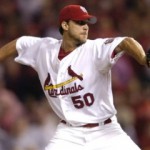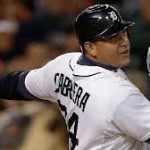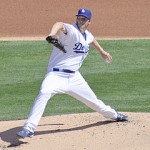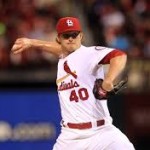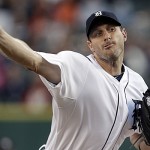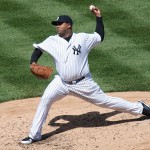
Sabathia remains the best chance for another 300-game winner .. Photo wiki/flickr chris.ptacek
Welcome to the latest installment of the “Will we ever see another 300-game winner” post.
(Aside; yes I know the limitations of the “win” statistic. However, nobody looks at a 20-game winner on the season or a 300-game winner for his career and excuses it as a statistical aberration; the pitcher win will continue to be important to players and in the lexicon of the game for years to come, despite Brian Terry‘s #killthewin campaigns).
Of the 24 pitchers in the game’s history to have reached the 300-game plateau, 4 of them have done it in the last decade (they being Randy Johnson, Roger Clemens, Greg Maddux, and Tom Glavine). However, there exists a distinct belief in the game that we may not see another 300-game winner for some time, thanks to pitch count obsessions, innings limits, 5-man rotations, NL small-ball managing, match-up relievers and generally a huge rise in bullpen usage over the last 20 years.
In the past year, I’ve collected some topical reading related to this post:
When we first broached this topic (in April 2009), Sabathia was still the best bet (outside of Randy Johnson, who sat at 296 before the 2009 season began), but it didn’t look that good for anyone else to reach the plateau, and a couple of the names we guessed as having an outside shot (Ervin Santana and Scott Kazmir) seem like ridiculous choices now. When we most recently broached this topic (at the end of the 2012 season), we explained some statistical models we and others were using to try to predict who may have the next best shot at reaching the mark. We concluded that Sabathia and Hernandez were both pretty good guesses at the time to reach the plateau.
How are things looking now?
I maintain a spreadsheet (uploaded to google and/or available via the links to the right of this page) that ranks candidates using a couple of formulas inspired by Jay Jaffe (see 2012’s post for the full thought process behind them). Basically Jaffe’s prediction models assume that the pitcher can win X games per year after a set age (in Jaffe’s case, his simple formula assumes pitchers win 15 games/year until their age 42 season, a relatively optimistic projection and hence why he self-titles it using the words “blindingly optimistic”). I’ve used a couple other methods to rank pitchers (calculating average number of wins past the age of 18 or 23, but since some guys get drafted out of HS and debut at 20 or 21 these projections end up looking ridiculous), in order to find candididates to put into the discussion. I also don’t really even consider a guy until he gets to 50 career wins, so there’s no wild speculation about someone like Shelby Miller (15 wins in his age 22 season) or Jose Fernandez (12 wins in his age 20 season).
So, without further ado, here’s a list of starters right now who are in the conversation of possibly reaching 300 wins in their career and my % chance opinion of getting there.
| pitcher |
age |
wins |
% Chance of making 300 wins |
| CC Sabathia |
32 |
205 |
75% |
| Clayton Kershaw |
25 |
77 |
50% |
| Felix Hernandez |
27 |
110 |
10% |
| Justin Verlander |
30 |
137 |
10% |
| Madison Bumgarner |
24 |
49 |
5% |
| Trevor Cahill |
25 |
61 |
5% |
| Zack Greinke |
29 |
106 |
5% |
| Mark Buehrle |
34 |
186 |
1% |
| Rick Porcello |
24 |
61 |
0% |
| Yovani Gallardo |
27 |
81 |
0% |
| Matt Cain |
28 |
93 |
0% |
Thoughts per starter:
- CC Sabathia remains the pitcher with the best chance of reaching 300 wins, but i’ve downgraded his probability from last year’s 90% to just 75% right now. Why? Well read no further than the link about his 2013 decline, where his FB velocity dropped, his ERA rose and he posted a sub 100 ERA+ value for the first time in his career. He still won 14 games, but his win totals have declined four years in a row. On the plus side, he’s a workhorse pitching for a team that historically has a great offense, which enables him to get wins despite an inflated ERA (he had 4 or more runs of support in 20 of his 32 starts in 2013 … Stephen Strasburg just started crying). It still seems entirely plausible he can average at least 10-12 wins for the next 7 seasons and hit the milestone before hanging them up.
- Clayton Kershaw improves his probability of hitting the plateau from last year to this year based on two factors: First, he has clearly stepped up and is now the pre-eminent starter in the game and seems set to continue to post 16-20 win seasons for the extended future. Secondly, the Dodgers now spend money like no other, ensuring a winning team that gets Kershaw victories even if he’s not pitching his best. He was “only” 16-9 in 2013; I would expect him to put up more wins each season in the next few years, and I wouldn’t be surprised to see him with 160 career wins before he’s 30.
- Felix Hernandez‘s chances have plummetted; going from 75% last year to just 10%. Why such a precipitous drop? Two factors; first he took a noted step back in FB velocity this year, to the point where pundits were questioning his arm strength. Secondly, he signed a massive deal to stay in Seattle … and Seattle right now is not a winner. It has a completely dysfunctional ownership and management group and seemingly has no idea how to put together a baseball team. They’re competing in a division of teams with better management willing to spend more money, and these factors are going to continue to have Hernandez put up the 13-14 win seasons he has been doing for the last four years. He’s already 27: if he’s doesn’t have back to back 20 win seasons his chances are kaput.
- Justin Verlander, like Hernandez and Sabathia, also had a curious drop in performance in 2013, leading me to drop his 300-game chances from one in three to one in ten. At age 30 he has logged just 137 wins and has gone from 24 to 17 to 13 in the last three seasons. If he can right the ship and get back to the 18-20 game win plateau, he can get his 300-game mojo back, but at age 30 he’s less than halfway there, so chances are looking pretty slim.
- Madison Bumgarner appears here mostly because of his advanced win totals at such a young age; he already has 49 career wins before his 24th birthday. He’s averaging 14 wins a season so far, and with a 14 win average in every season between now and his age 40 year he’d hit his mark. But I have his chances right now at only 5%; its just too early to really tell if Bumgerner will have the endurance and continued success to get there. Plus, is Bumgarner an elite starter or more in the mold of a Mark Buehrle (i.e., a durable lefty who grinds out 13-14 win seasons for a decade)?
- Trevor Cahill is in nearly the same boat as Bumgarner, except that I don’t think he’s quite as good. In fact, Cahill seems like he’s bound for Mark Buehrle territory (see below); an innings eating guy who is always right around the 13-12 mark each season. If he does this for the next 15 years, he may get close. I give him a slight chance.
- Zack Greinke has gone from not even being considered to having a 5% chance. Why? Well he’s signed a huge long term deal with a very good team AND he now pitches in both the NL and in a pitcher’s park. In 2013 he put up a very quiet 15-4 record and I think with his stuff and his health he could put up multiple 16-18 win seasons. That’d get him to the mid 200s by the time he’s nearing 40 … maybe enough to have him go for it while pitching into his early 40s. Or maybe not; by the time he’s 40 he’ll likely have nearly $250M in career earnings and may just buy a ranch somewhere.
- Mark Buehrle‘s career 162 game average W/L record (14-11) is identical to Bumgarner’s. In his last 5 season’s he’s won 13 games four times and 12 games once. I have given him a 1% chance of hitting 300 on the off-chance that he pitches well into his mid 40s, continues to put up 4th starter figures and finishes with a career record of something like 302-285. He doesn’t miss many starts, so perhaps he’s that durable.
- The last three guys mentioned (Rick Porcello, Yovani Gallardo and Matt Cain) are all given 0% chances at this point but are listed thanks to their advanced win totals by their mid 20s. Cain’s sudden drop off in 2013 (a common theme in this list) has seemingly cost him any shot at reaching 300 wins despite his normal sturdiness. Gallardo had a 10% chance last year and drops to zero thanks to my having almost no confidence that he is a good enough pitcher to accumulate enough wins going forward. And Porcello remains essentially a 5th starter who just happened to matriculate to the majors at the tender age of 20. I can see him having a career similar to Buehrle’s; long tenures of near .500 record. In fact, ironically Porcello’s 162-game average W/L record is identical (14-11) to Buehrle’s … which is also identical to Bumgarner and very close to Cahill’s. I think there’s something clearly “accumulator” in nature to all these guys.
What has happened to some of the candidates from last year not mentioned yet?
- Roy Halladay went from a near Cy Young season in 2011 to retirement in just two short seasons. Shoulder injuries are a killer. He retires with 203 wins.
- Chad Billingsley lost nearly the entire 2013 season to injury, scuttling what dim chances he had. He’s now not even guaranteed a spot in LA’s high powered rotation.
- A bunch of veterans who already had little chance (but were mentioned anyways) have now retired: Jamie Moyer, Livan Hernandez, Andy Pettitte, and Kevin Millwood.
- Tim Hudson is an interesting case; he sits at 205 wins, lost a chunk of last season to injury but signed on in a pitcher’s park in SF. He’s gotten 17,16 and 16 wins the last three seasons in his mid 30s; can he just continue to get 16-17 win seasons and suddenly be looking at 300 wins by the time he’s 42? Maybe, but he’s going to have to be good these next two seasons.
Thoughts? Do you care about 300 winners like I do, or is it just an anachronism of baseball history that will go the way of 300 strikeouts, 30-wins and hitting .400?
